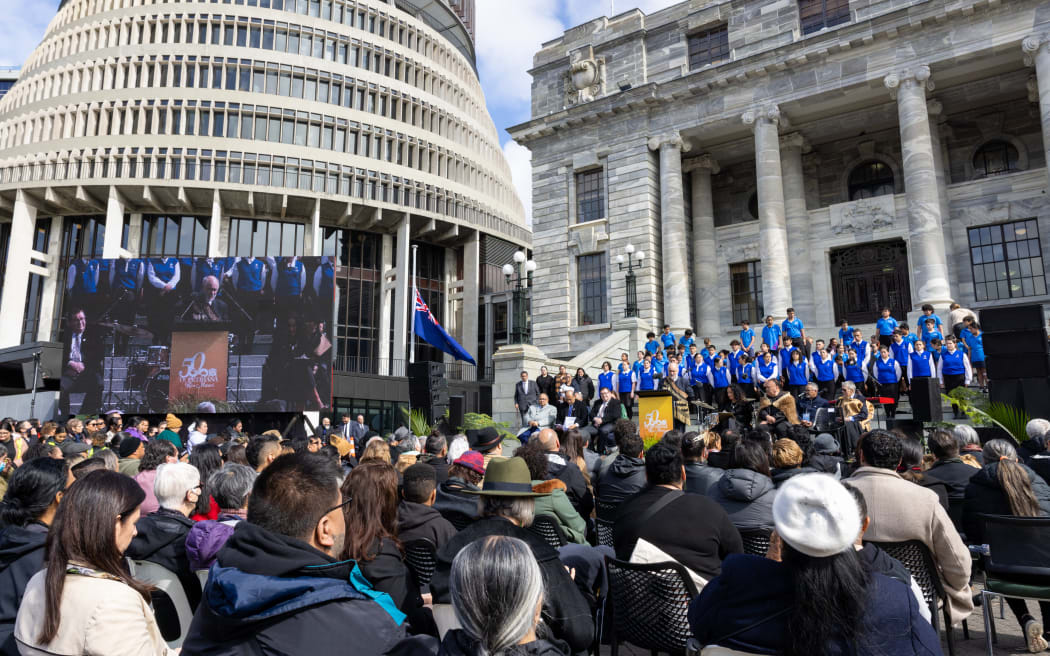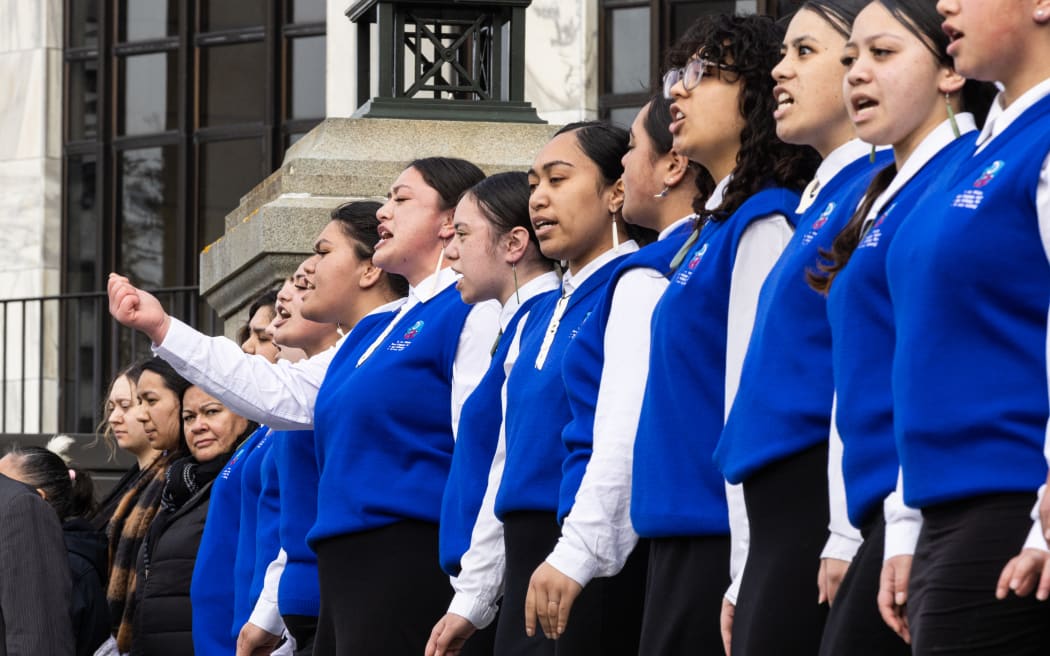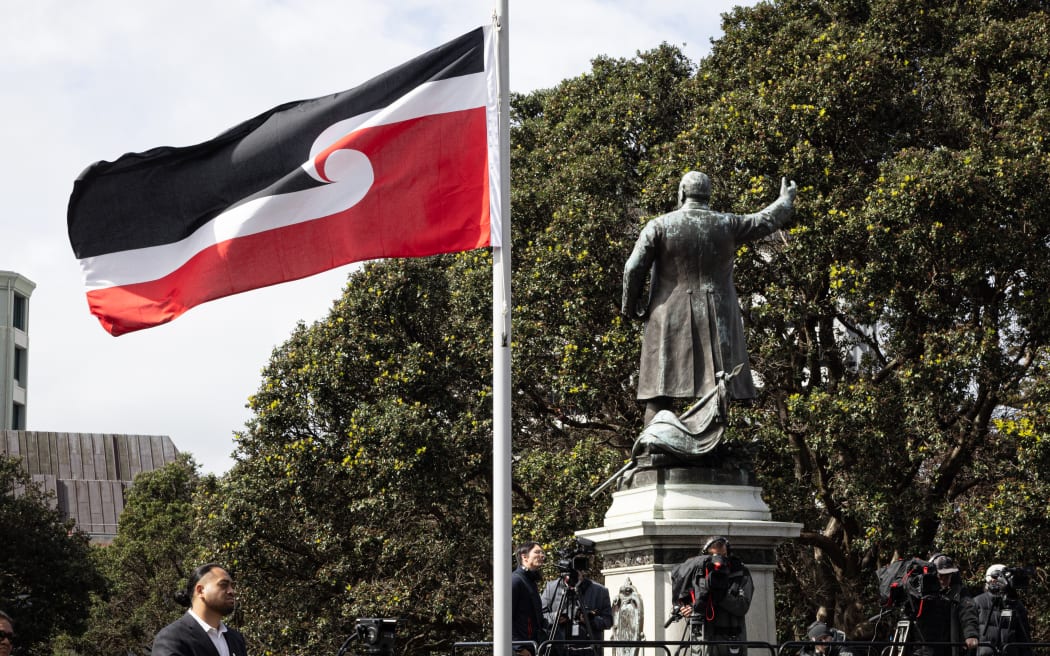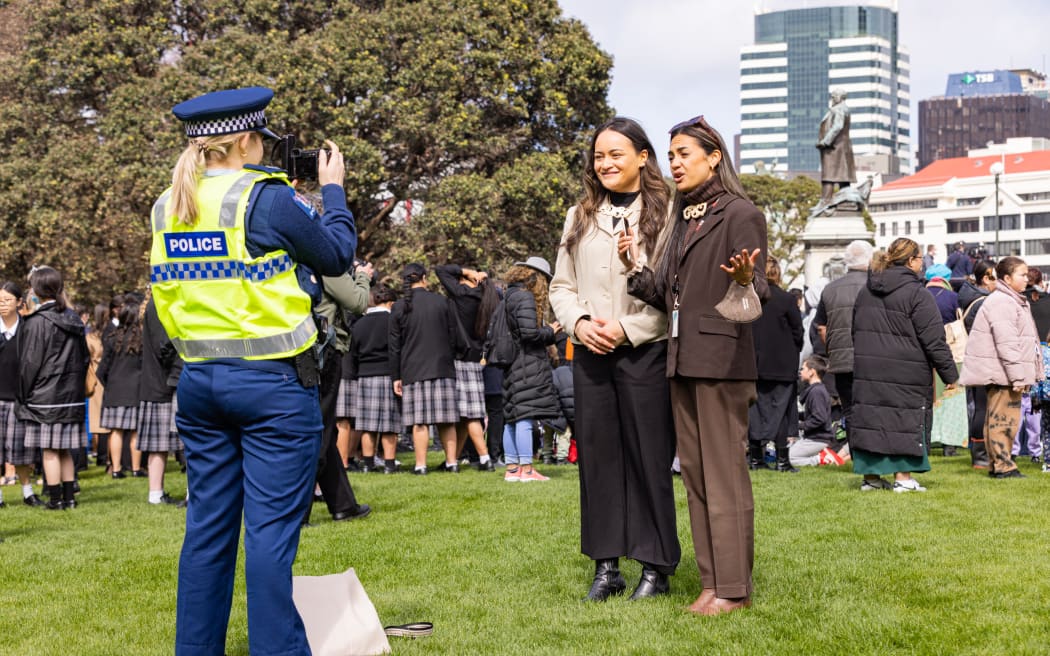The revitalisation of te reo Māori was abundantly evident as a big crowd converged on Parliament to mark 50 years since the Māori Language Petition.
Signed by over 30,000 people, and delivered to Parliament on 14 September 1972 by Representatives of Ngā Tamatoa and the Te Reo Māori Society, the petition called for te reo Māori to be actively recognised across New Zealand and for the language to be taught in schools. At that point, and for much of last century, the use of the language in this country had declined, having been marginalised by the education system and brutally discouraged.

An event was held at Parliament on 14 September 2022 to commemorate the 50th anniversary of the Māori language petition. Photo: Phil Smith
Among the crowd on Wednesday were many Māori with stories of how generations of whānau before them had been denied access to their language and culture. One of them was nurse practitioner Nayda Heays who works at the Intensive Care Unit at Hastings Hospital.
“A lot of Aotearora think that our tipuna were being punished a long time ago, but that’s just one generation ago, and that’s my mother. My mother was punished as a five-year-old at a native school in Tuhoi because she didn’t learn English until she was five. She was raised by her grandparents. So it’s not that long ago, it’s in the 1940s, (where people were) being punished for speaking Māori; and the history of Aotearoa where it became very segregated, and then assimilated, where Māori were assimilated into the culture at the time and they believed that. So as a result, my parents - who are fluent in te reo Māori - weren’t big advocates to speak it at all. They wanted us to go through a western education system. And now, full circle, their mokopuna are fluent in te reo Māori. So that’s my identity journey right now.”
People are increasingly embracing the use of te reo Māori in the workplace, as its value is clear.
“A solid 75 percent of the beds (at the hospital) for twelve months of the year are occupied by Maori and Pacific people. If we can’t connect through reo then we can’t make therapeutic relationships with our patients who need us in the most acute ways. Reo is about identity, and if we encourage the reo then we have a foundation for our identity,” Heays explained.

Students from Te Ara Whanui Kaupapa Māori perform at Parliament, 14 September 2022, the 50th anniversary of the Māori Language Petition. Photo: Phil Smith
“In the context of my own whānau I think about how my parents weren’t able to teach me the reo or the tikanga, the culture, really thoroughly. That’s because their parents had it beaten out of them, basically,” said Te Rama Durie.“So it’s really important because it’s helped me with my own identity and purpose, and my mahi. So I’ve been back to learn the reo as a result of this, I’d say.”
Journalist and broadcaster Māni Dunlop said the 1972 petition stood as a turning point in the revival of the language, and was part of a wider series of efforts to reclaim Māori rights.
“It was what has been called the catalyst that - as my colleague Jamie Tahana wrote - woke Aotearoa out of not thinking that we had race relations issues, out of that stupor. We are here fifty years later and seeing the fruits of their labour,” she said at the event, noting the large gathering on Parliament’s forecourt including students from Kura Kaupapa, Kohanga Reo and Wānanga, and graduates of those schools and institutions.
This week is Te Wiki o te reo Māori (Māori Language Week), a government-sponsored initiative to encourage the use of the language. But for advocates like nurse educator Tiara Williams, the aim is an ongoing one not restricted to merely one week a year.

The Tino Rangatiratanga flag flies at Parliament next to the statue of early Premier Dick Seddon. The event was on 14 September 2022 to mark the 50th anniversary of the Māori language petition. Photo: Phil Smith
“This is kind of a milestone for us in showing that we are working towards that revitalisation of te reo Māori. Currently at the moment about 20 percent can have a conversation in te reo Māori, which is awesome and we just want to push those numbers even higher. We want to spread the word out not only for Māori, for everyone who lives in Aotearoa and beyond that. So that’s our goal,” Williams said.
With that goal in mind, when I asked Te Rama Durie if things were on the right track, he said he was hopeful.
“I just think about the untapped potential of exploring and including Tikanga and te ao Māori in everyday Kiwi culture. Spirituality is huge for Māori. I work in construction, and we do health and safety, and it’s a lot of tick box exercises.
But I think if we look at it from a te ao Māori perspective, where we induct people on to site for health and safety, that’s already Tikanga Māori with regards to: you bring manuhiri or guests onto your site or your marae, and then you take care of their wellbeing while they’re there,” he said.
“So it’s things like that. There’s already systems that existed pre-colonisation that we can tap into now, and it will help us in the modern world. And it comes back to things like wellbeing, focussing on your spiritual wellbeing and the whole tapa whā model, then it’s better for everyone in society.”

An event was held at Parliament on 14 September 2022 to commemorate the 50th anniversary of the Māori language petition. Photo: Phil Smith
Dunlop said much had been achieved for te reo Māori over the past fifty years, but that much work is still to be done. A lot had been happening in this space, she added, in central and local government, as well as broadasting institutions and others.
“We still have a lot of pushback. Many Māori broadcasters in mainstream… the hate that we get for using te reo. People don’t like change, eh. But the waka is moving in this direction and you have to get on otherwise you will be left behind. To counter the hate and people who don’t like it is a massive wave of people who do love it.”

